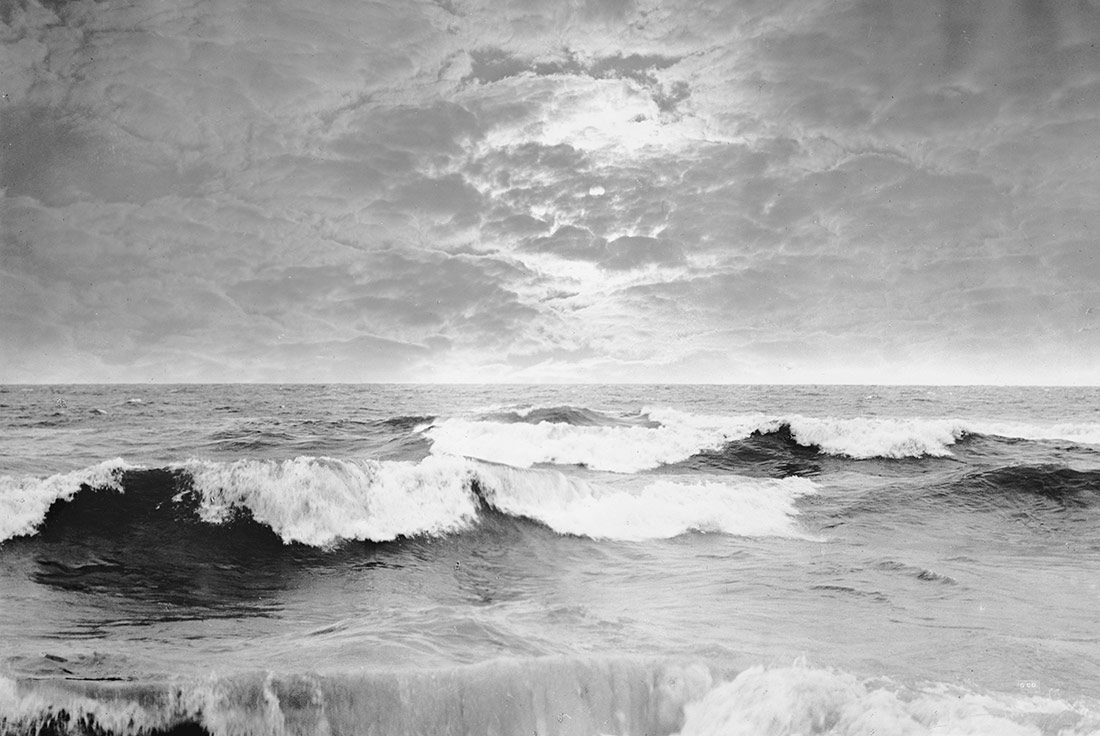
A Bit of Atlantic surf, 1906 | Library of Congress | Public domain
The sea gives us back whatever it is given. If we give it rubbish, it gives us rubbish back in our food and on our beaches. If we fail to conserve its habitats and species, it stops providing us with food and protecting our coasts from severe weather. The ocean affects all of us, and we affect the ocean, even if we live far from its shores. It has been shown that we can restore the damage done to ocean health, but we have a limited amount of time. As individuals, we are more able than we might think to protect and conserve it through actions that have a far greater impact than we realise.
Until not so many years ago, the sea was considered a vast place capable of supplying us with an unlimited amount of fish, and which in turn “swallowed” everything that we wanted to get rid of. An immense dump where all our rubbish became invisible under its infinite waters; like sweeping everything under the carpet and pretending nothing had happened. It was only a few years ago that the human species (and even then, not all of its members!) began to realise that the ocean is not as infinite as it seemed. Today’s science and technology allow us to explore its depths and see what was previously hidden from sight. Chemical pollutants, cans, tyres, household appliances – every conceivable object can end up in the sea. And some of them can’t be found because they’ve disintegrated into tiny particles, as is the case with plastics. But much of the rubbish and many of the actions perpetrated against the health of the ocean are now affecting us. We are eating plastic in the fish and the salt we consume. We are seeing how the devastating effects of storms, cyclones and tsunamis have been magnified in areas where we have torn down barrier vegetation, such as mangroves or seagrass meadows, to replace it with structures that seemed more useful or lucrative. We are seeing how some of the species of fish we are so partial to are now disappearing because we have fished them out of balance or because we have destroyed their habitats. Like a kind of oceanic karma, the ocean gives back what it is given.
The ocean provides an invaluable service to the planet and to mankind, but this is a fact that many people are still unaware of. For example, it regulates the climate of the entire planet and has absorbed one third of the greenhouse gas emissions we have released into the atmosphere as a result of things such as burning fossil fuels, cement production, shifting land use to agriculture and so on. Some particularly important areas for absorbing the greenhouse gas carbon dioxide are coastal mangroves, salt marshes and seagrass meadows (blue carbon ecosystems), which sequester ten times more carbon per hectare than inland ecosystems. However, many of these coastal ecosystems have been destroyed in the mistaken belief that they should make way for supposedly more lucrative activities. Greenhouse gases are warming the Earth, but the ocean has absorbed 90% of that heat, leaving us with a much cooler climate than we would have otherwise. The ocean is a source of food for millions of people around the world and is also home to countless species of flora and fauna, many of which are commercial or the source of valuable chemicals harnessed for medical treatments.
I am talking about the ocean and not the oceans because, in reality, they are all connected as one. What happens in one ocean basin can affect another. What we do in one coastal area can affect the water, flora, fauna and people in another part of the world. Everything is connected through ocean currents. But this is not only true inside the ocean – rivers and sewers also run into the sea, and what you flush down the toilet in your home can find its way into the ocean and affect its marine life.
So the ocean does a lot for us, even if we live far away from its shores. But for the ocean to perform all these services it must be healthy – the healthier it is, the better it does its job. Which is why it’s important to protect it. Only 7% of the world’s ocean is protected, and just 2.7% is highly protected. These are areas where fishing, shipping and all extractive activities are prohibited. Several studies have concluded that at least 30% of the ocean should be protected in order to safeguard marine ecosystems in the long term. One of the Sustainable Development Goals adopted by the United Nations General Assembly in 2015 was to “Conserve and sustainably use the oceans, seas and marine resources for sustainable development” (goal 14). Coastal nations pledged to protect 10% of their waters by 2020 (a goal that has not been met) and 30% by 2030. This goal is intended to run parallel to the protection of 30% of terrestrial ecosystems.
Many of the mistakes committed to the detriment of ocean health can be corrected. For example, mangroves and seagrass beds can be restored in areas where they were previously removed. It has also been observed that by protecting certain areas we can give fish stocks, many of them for human consumption, the chance to build up again. However, the most difficult part of all this is not the financial or logistical effort but the human willpower. It is difficult to convince governments of how highly profitable and beneficial such actions would be. Many think that they would have a very high economic cost, when in fact it has been shown that restoring and protecting these areas is much more cost effective than the consequences of failing to do so. It is also important to protect the oceans from pollution. Eighty percent of the plastic that reaches the sea comes from land-based sources, mainly rivers. We have to reduce waste of all kinds and improve infrastructures to prevent all this plastic from ending up in the ocean.
According to a report by the United Nations Environment Programme (UNEP), throughout human history, coastal zones have never been as economically important as they are today. The services that these ecosystems provide to the world are worth more than 25 billion dollars a year, and they include protecting the coasts and the people who live there, increasing fish stocks, filtering out pollutants and mitigating the effects of climate change.
There is still time to solve many of the ocean’s problems, but it is fast running out. And if we wait too long, many of these problems will become irreversible, which is why the measures needed to conserve the ocean must be taken without delay. Some people think that their own individual actions don’t have much impact and don’t make a difference. We say to ourselves “who cares if I don’t take the car today, or if I don’t use a plastic cup if everyone else is doing it?” But it is estimated that individuals have the capacity to produce 30% of the emissions reductions needed to keep the temperature rise below 1.5°C. The other 70% is up to governments and businesses, although we, as individuals, can also influence them. We are the ones who vote and we are the ones who decide where to buy our products. If a critical mass is reached, politicians, of whatever stripe, will put it at the top of their election agenda. As individuals we can decide not to buy from a company if we don’t agree with their environmental policies. And this has been proven to work, as has been seen with many products that were discontinued or ingredients that were phased out when the public began to reject them because of their harmful effects on the environment.
The individual actions that can be taken by each of us include reducing our consumption in general, which is essential for reducing greenhouse gas emissions. We can also choose a diet with a lower environmental impact by eating less meat, especially red meat, which generates the highest emissions. We can choose seafood products with a lower carbon footprint, such as mussels, clams or seaweed. We can avoid food waste, as one third of the food produced in the world is thrown away – if this waste were a country, it would be the third highest emitter after China and the USA. We can refuse to use disposable products, whether they are made of plastic, wood or paper, because they generate emissions as well as polluting the ocean. Wherever possible, we can choose public transport over private cars, and trains over planes. And it has been shown that electronic goods should be used for at least seven years in order to reduce their environmental impact. And above all, and very importantly, we can raise environmental awareness. We can tell others what we know so that they are also aware of the problem and the possible solutions, and thus reach the critical mass needed to push for conservation.
The climate crisis may well be the most serious environmental problem ever faced by humanity throughout its entire history. The ocean can help mitigate its effects, as well as providing all the services we have mentioned to the planet and to humankind. So to protect the ocean is to protect ourselves. Let’s start creating good ocean karma.




Leave a comment